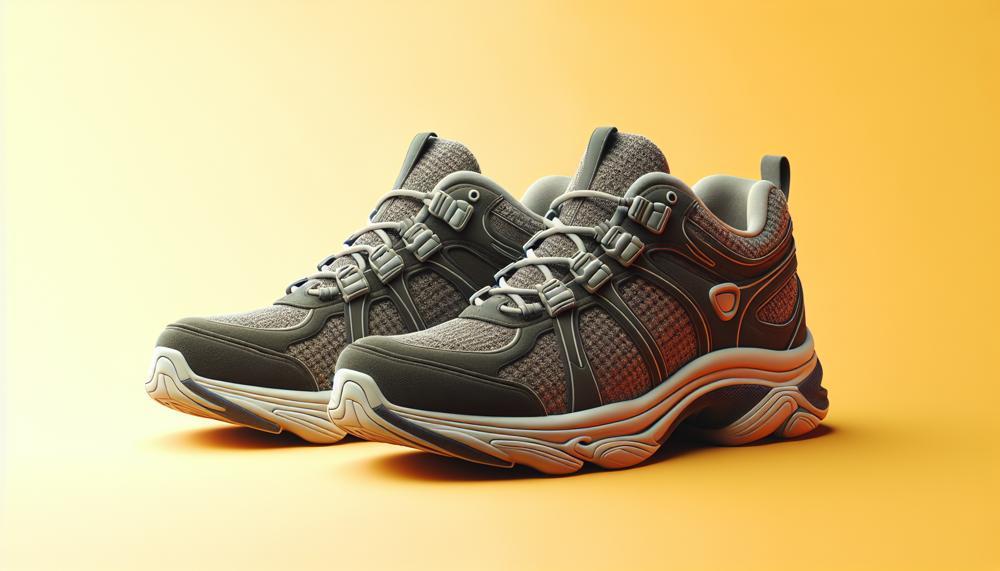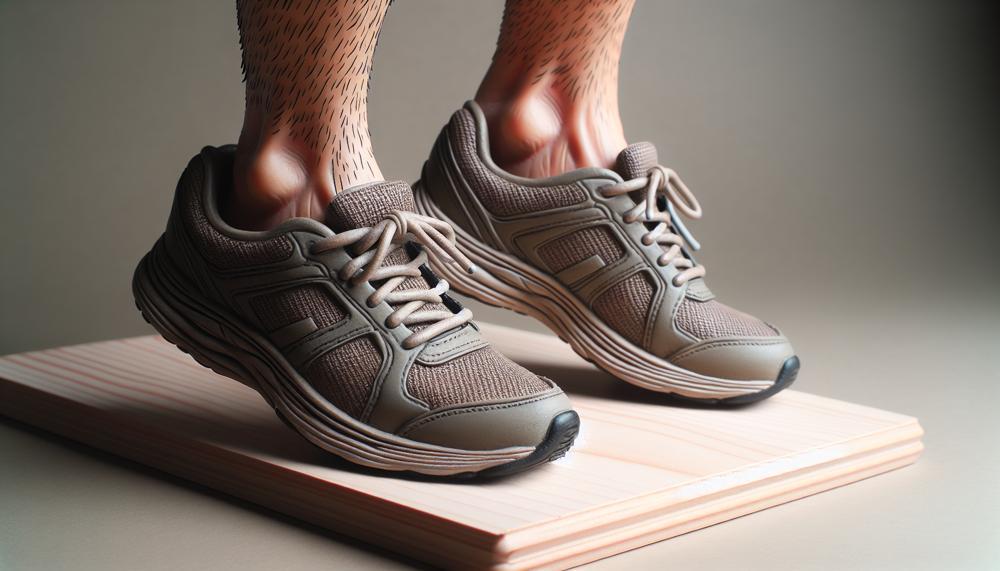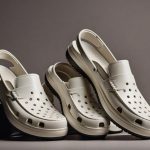Are you someone who loves to walk but struggles to find the right shoes due to your weight?
Do you want a pair of shoes that can support your body and keep you comfortable on your walks? Well, look no further because we have curated a list of the best shoes for obese walkers.
These shoes not only provide style and durability but also offer the necessary support and cushioning for your feet. Say goodbye to blisters, foot pain, and discomfort while walking with our top picks.
From lightweight sneakers to sturdy hiking boots, we have something for every type of walker. So lace up your shoes and get ready to hit the pavement with confidence and comfort.
Let’s take a step towards a healthier lifestyle without compromising on style or comfort.
What Are The Best Shoes For Obese Walkers?
Contents
- 1 What Are The Best Shoes For Obese Walkers?
- 2 How Obesity Affects Foot Health and Walking Comfort
- 3 Factors to Consider When Choosing Walking Shoes for Obese Walkers
- 4 Top Brands and Models for Obese Walkers: Asics Cumulus 23, Saucony Cohesion, New Balance MW928v3/WW928v3, Propét Denim Sneakers, Drew Force/Flash Velcro, Skechers Go Walk Joy, New Balance WW813, Asics Venture 8.
- 5 Features to Look for in Walking Shoes for Obese Individuals: Comfort, Breathability, Support, Stability, Sole Grip, Cushioning, and Weight.
- 6 Tips for Finding the Right Fit for an Obese Walker’s Feet and Body Type.
- 7 Proper Care and Maintenance of Walking Shoes for Obese Walkers.
- 8 Conclusion
When it comes to finding the best shoes for obese walkers, there are a few key factors to keep in mind. Good support, stability, cushioning, a proper fit, breathable materials, and durability are all essential for ensuring comfort and preventing potential injuries while walking.
It’s important to take the time to try on different shoes and find the right fit and feel for your individual needs, rather than simply relying on brand recommendations.
For those looking for walking shoes specifically designed for obese walkers, there are certain features to look out for. A firm midsole, wide base, ample cushioning, a wide toe box, breathable materials, and strong construction are all important elements to consider.
Investing in a high-quality pair of walking shoes that meet these requirements can make a significant difference in both comfort and overall foot health.
How Obesity Affects Foot Health and Walking Comfort
Being overweight can greatly affect the health of your feet and your comfort while walking. The excess pounds carried by obese individuals can put added strain on their feet, leading to various foot conditions and discomfort when walking. These can include overpronation, plantar fasciitis, and general foot pain. To address these issues, it is crucial to choose the right shoes for obese individuals.
One of the main problems caused by obesity is overpronation, where the foot rolls excessively inward while walking. This can result in an unstable gait and increase the risk of injuries. To prevent this, it is important to choose shoes with good arch support that can help stabilize the foot and reduce the strain on it.

Plantar fasciitis, which causes pain in the heel, is another common problem that obese people experience. Obesity has the potential to make this condition worse. Therefore, selecting shoes with ample cushioning is essential, as they can absorb shock and reduce pressure on the feet, providing a more comfortable walking experience.
Moreover, being overweight can cause the feet to widen, leading to discomfort when wearing narrow-toed shoes. To avoid this problem, it is recommended to opt for shoes with a wider toe box that can provide more room for the toes to spread out and reduce pressure on the forefoot.
Obese individuals need to look for shoes with a durable and supportive outsole.
As they put more stress on their feet, their shoes need to have a sturdy outsole that can withstand the added weight and provide proper stability while walking.
Factors to Consider When Choosing Walking Shoes for Obese Walkers
Selecting the right walking shoes for obese individuals requires careful consideration of various factors, including support, cushioning, stability, and durability.
These elements play a crucial role in preventing foot pain, improving posture, reducing the risk of injuries, and ensuring a comfortable walking experience. It is imperative to try on different shoe styles and sizes to find the perfect fit for your feet.
Giving importance to foot health is vital for those dealing with obesity, and choosing the appropriate footwear can greatly impact their overall comfort and mobility.
When it comes to support, walking shoes should provide ample arch support to distribute weight evenly and reduce strain on the feet. Cushioning is also essential to absorb shock and reduce pressure on the heels and toes.
Additionally, stability is crucial in preventing overpronation or supination, which can lead to foot and ankle injuries. Durability is another factor to consider, as obese individuals put more pressure on their shoes than the average person.
However, selecting the right walking shoes can be challenging for obese walkers due to their unique needs. It is essential to seek expert advice from shoe specialists or physical therapists trained in fitting shoes for obese individuals. They can provide valuable insights and recommendations based on your specific foot structure and needs.

It is vital to prioritize foot health over style when choosing walking shoes for obese walkers. While trends may come and go, finding a pair of shoes that fits comfortably and provides proper support is paramount.
Keep in mind that style is always achievable by matching the appropriate shoes to your outfit, with comfort being the top priority.
Top Brands and Models for Obese Walkers: Asics Cumulus 23, Saucony Cohesion, New Balance MW928v3/WW928v3, Propét Denim Sneakers, Drew Force/Flash Velcro, Skechers Go Walk Joy, New Balance WW813, Asics Venture 8.
When I first started my fitness journey, I made the mistake of choosing style over comfort, and I ended up with blisters and sore feet. That’s when I realized that finding the perfect walking shoe is crucial for obese walkers like myself.
After trying out various brands and models, I have narrowed down my top picks for obese walkers. These include the Asics Cumulus 23, Saucony Cohesion, New Balance MW928v3/WW928v3, Propét Denim Sneakers, Drew Force/Flash Velcro, Skechers Go Walk Joy, New Balance WW813, and Asics Venture. Each of these shoes offers unique features that cater to the needs of obese individuals.
Asics Cumulus 23
The Asics Cumulus 23, for example, is known for its cushioning and shock-absorbing abilities. This is perfect for those with extra weight on their feet, as it reduces the impact on their joints and muscles. The Saucony Cohesion is another great option with its comfortable fit and breathable material.
New Balance MW928v3/WW928v3
For those looking for a wider shoe, the New Balance MW928v3/WW928v3 is an excellent choice. Its spacious design accommodates larger feet while providing support and stability. The Propét Denim Sneakers are also a favorite among obese walkers due to their lightweight design and adjustable fit.
If you struggle with foot conditions such as plantar fasciitis or flat feet, the Drew Force/Flash Velcro is a great option. It offers superior arch support and customizable insoles to alleviate any discomfort. For those who prefer slip-on shoes, the Skechers Go Walk Joy is a must-try. Its responsive cushioning and flexible sole make it ideal for long walks.
New Balance WW813
The New Balance WW813 is another fantastic option for obese walkers, with its motion control technology and durable construction. Lastly, the Asics Venture 8 is perfect for those who enjoy walking on different terrains, thanks to its rugged outsole and waterproof design.
As you can see, there are plenty of options for obese walkers when it comes to finding the perfect walking shoe. It’s essential to consider factors such as cushioning, support, and fit when making your decision. Don’t make the same mistake I did and prioritize comfort over style.
Features to Look for in Walking Shoes for Obese Individuals: Comfort, Breathability, Support, Stability, Sole Grip, Cushioning, and Weight.
When it comes to choosing walking shoes for obese individuals, there are a few key features that are crucial for their comfort and effectiveness.
These features include comfort, breathability, support, stability, sole grip, cushioning, and weight. Each of these plays a vital role in ensuring that obese walkers can walk comfortably and safely.
Comfort:
For those carrying excess weight on their feet, comfort is of utmost importance. Tight or ill-fitting shoes can cause discomfort and pain while walking, which can discourage obese individuals from staying active.
Therefore, it is crucial to choose shoes that provide enough room and are comfortable for their feet.
Breathability:
Obese individuals may experience increased sweating due to their weight, so it is crucial to choose walking shoes that are breathable. This allows for proper air circulation and prevents the feet from getting too hot and sweaty.
Breathable shoes not only promote comfort but also prevent issues like blisters and foot odor.
Support:
Support is essential for obese individuals as their feet carry extra weight.
Walking shoes with proper support can help distribute the weight evenly and reduce strain on the feet and ankles. This helps prevent discomfort and pain while walking.
Stability:
Balance and stability can be a challenge for obese individuals, making it important to choose walking shoes that offer good stability.
Shoes with a wider base and firm heel counter can prevent the foot from rolling inward or outward while walking, promoting better balance and stability.
Sole Grip:
Another important feature to consider when choosing walking shoes for obese individuals is sole grip.
Due to their weight, obese individuals may have a higher risk of slips and falls. Therefore, it is crucial to choose shoes with good traction to prevent accidents and injuries while walking.
Cushioning:
Cushioning is vital for reducing impact on the feet while walking.
Adequate cushioning in the heel and forefoot areas can absorb shock and prevent pain and discomfort in obese walkers.
Weight:
Lastly, the weight of the shoes can significantly impact their comfort and effectiveness for obese walkers. Heavy shoes can add unnecessary strain and fatigue, making it more difficult to walk comfortably. Therefore, it is important to choose lightweight shoes that still provide ample support and cushioning.
Tips for Finding the Right Fit for an Obese Walker’s Feet and Body Type.
When it comes to finding the right fit for obese walkers, there are a few key factors to consider. First and foremost, pay attention to your foot width. Many brands offer wide or extra-wide sizes specifically designed for those with wider feet, ensuring a comfortable fit without causing discomfort.
In addition to foot width, cushioning and support are crucial elements to keep in mind. Look for shoes with extra cushioning and arch support to alleviate pressure and shock on the feet. This can help prevent pain and discomfort, making your walking experience more enjoyable.
Proper arch support is also important for maintaining proper alignment and reducing strain on the feet. Be sure to choose shoes with adequate arch support to keep your feet in prime condition.
When it comes to materials, breathable options are ideal for obese walkers. Look for shoes made from materials like leather or mesh, which can help prevent excessive sweating and potential foot infections.
Lastly, consider the design and structure of your shoes. Opt for a wide base, sturdy construction, and low heels for stability and comfort while walking. This will ensure a safe and comfortable walking experience for those with larger bodies.
| Factors to Keep in Mind | Examples/Details |
| Foot Width | Be sure to consider your foot width when searching for the perfect pair. Look for wide or extra-wide sizes that can accommodate wider feet without causing discomfort. |
| Cushioning and Support | For optimal comfort and protection, look for shoes with extra cushioning and arch support. These features can help reduce pressure and shock on the feet, preventing pain and discomfort. |
| Arch Support | Proper arch support is crucial for maintaining proper alignment and reducing strain on the feet. Look for shoes with adequate arch support to keep your feet happy and healthy. |
| Material | The material of your shoes is important, especially for those with larger bodies. Opt for breathable materials like leather or mesh to prevent excessive sweating and potential foot infections. |
| Design and Structure | The design and structure of your shoes can greatly impact your walking experience. Look for shoes with a wide base, sturdy construction, and low heels for stability and comfort while walking. |
Proper Care and Maintenance of Walking Shoes for Obese Walkers.
Taking proper care of and maintaining your walking shoes is vital for obese walkers to guarantee durability and comfort while walking. This involves selecting the perfect pair, regularly cleaning and replacing them, and following general maintenance practices to keep them in excellent condition.
When it comes to choosing the right pair of walking shoes, many people tend to overlook the importance of finding the perfect fit. However, for obese walkers, this step is crucial, as it can make or break their walking experience. A poorly fitting pair of shoes can lead to discomfort, blisters, and even injuries. Therefore, it’s essential to try on different sizes and styles to find the one that best suits your feet.
Keeping your walking shoes clean is essential for both hygiene and durability purposes. Regularly washing them with soap and water and letting them air dry can help prevent bacterial and fungal growth, which can cause unpleasant odors and decrease the lifespan of your shoes.
In addition to cleaning, replacing your walking shoes when they start to show signs of wear and tear is also crucial. As a rule of thumb, it’s recommended to replace your walking shoes every 300–500 miles or every 6–12 months, depending on how often you use them. This will ensure that you have proper support and cushioning while walking and reduce the risk of foot injuries.
Lastly, general maintenance techniques such as loosening the laces before putting on or taking off your shoes, rotating between different pairs to prevent overuse, and storing them in a cool and dry place can also prolong the life of your walking shoes.
Conclusion
In conclusion, the search for the perfect shoes for obese walkers is a crucial step towards a comfortable and safe walking experience.
From support and cushioning to stability and durability, there are many factors to consider when choosing the right pair. It’s important to try on different styles and sizes to find the perfect fit that will provide the necessary support for your feet.
And don’t forget about maintenance; regular cleaning, replacement, and general upkeep can greatly extend the life of your walking shoes.






